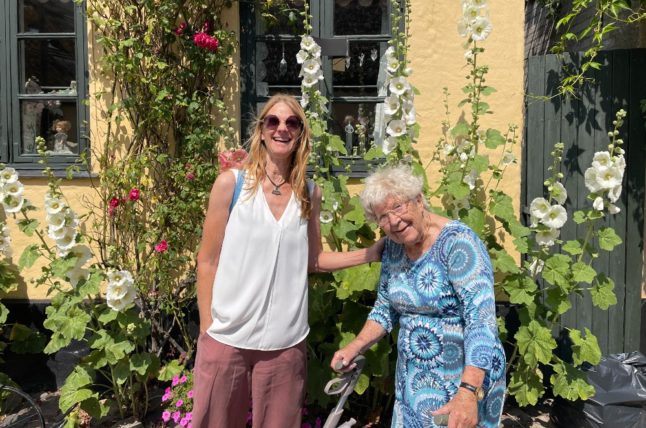Kim Klockenteger’s parents retired to their native Denmark in the late 1980s after raising Kim and her siblings in the United States, Spain and the Middle East. It was Kim’s father’s work that meant they moved around the region.
Since her father passed away two decades ago, Kim’s mother, Lillian Scharn, aged 98, has lived alone at her home in Frederikssund.
Kim, who has regularly visited Lillian for years, told The Local she wants to be able to stay in Denmark on a more long-term basis because her mother is getting older and more frail.
Because her parents became US citizens before she was born (her mother holds dual citizenship), Kim is not a Danish national and so applied in 2022 for a Danish residence permit under family reunification rules to be able live with her mother in Denmark.
The application was rejected because Kim was not considered to have close enough ties to the Nordic country, and because authorities consider her mother’s care needs to be adequately provided for by public social and health services.
“I was very innocent about it, I just assumed that it would not be a problem. She was 97 at the time. Well, they turned me down, saying that I didn’t have enough connections with her, or with Denmark,” she said.
“I ended up sending them back a bunch of paperwork proving that all the generations of my family are Danish. I kept my last two passports and in 20 years, I had 56 stamps into Denmark,” she said.
“I had to fill out paperwork, saying that I’m the only family member who can come over and help her. I also got a letter from the doctor because she has a really bad back, so she struggles with doing many things,” she said.
Kim appealed the decision – and was not allowed to stay longer than 90 days in Denmark while the appeal was being processed – before eventually being told her case would not be reopened, according to a letter from the Immigration Appeals Board seen by The Local.
Without a residence permit, Kim can only visit Denmark as a tourist, meaning she is allowed to spend up to 90 days in the country, then must leave for 90 days before being permitted to return.
“For a year and a half, I’ve been doing the 90-day-90-day thing, which is expensive and not a lot of fun,” she said.
In rejecting the appeal, she was told that because Denmark provides elderly care through its public health system, she could not be granted residency on this basis.
“It’s ironic, because we hear in the news that the government doesn’t have money to take care of the elderly now and you need to start depending more on family and neighbours,” she said.
In January, the government said it would allow more people from abroad to be granted permits to work in Denmark’s social health sector, which includes elderly care.
“The labour shortage is by far the biggest problem for our health system and elderly care, so it makes no sense for us to get in the way of skilled foreign healthcare professionals who want to work in Denmark,” Health Minister Sophie Løhde said in a government statement.
READ ALSO: Denmark confirms deal to recruit 1,000 health staff from abroad
Kim said that there is no chance of the decision on her appeal being changed unless there is a change in her circumstances, for example if her mother goes into palliative care.
In a letter dated December 14th 2023, seen by The Local, the Immigration Appeal Board (Udlændingenævnet) told Kim that it upheld the earlier decision by the Danish Immigration Service (Udlændingestyrelsen) to reject her application for family reunification.
In the letter, the appeals board wrote that “there does not appear to be any special connection between Lillian Edel Scharn and her daughter, Kim Scharn Klockenteger, beyond what follows from the kinship itself.”
It also states that failing to grant residency to Kim is not in breach of rules protecting family life under the EU human rights convention, that there is not a “particularly qualified dependency or attachment relationship”, and that that the daily living assistance needed by Lillian can be provided by Denmark’s public social care services.
Kim described the application of the rules to her case as “frustrating”.
“You’re just a number. I did not speak to a single person during this whole process. I tried to, I got a lawyer and we tried and they said, ‘Oh, no, no, everything is just done on the computer.’ And I wasn’t even allowed to speak to my caseworker. And that’s the frustrating part because I feel like I don’t have a voice,” she said.
“I love Denmark, and I love the Danish people. And, you know, it’s in my blood. And I’m like, wait a minute, this is very disappointing,” she said.
“My mother’s 98. And she’s a Dane, they should be helping her and not making life more difficult,” she said.
“Her back is very bad. She’s all crunched over. She can’t put on jackets, she can’t reach things in the kitchen. It’s extremely difficult for her to cook because you know, things are heavy. And her memory is slowly starting to go and she’s starting to struggle with words.
“And after every three months, I come back, I can see that she’s getting older. And it’s normal for her age. She just doesn’t want to have strangers come and take care of her when it gets to the point where she really can’t do anything for herself,” she said.
“You know, when you’re 98 years old, you deserve your life to be easy,” she said.



 Please whitelist us to continue reading.
Please whitelist us to continue reading.
Is Lillian too old to travel ? In this circumstances even though not optimal have Kim considered to take her mom back to USA as she already have dual citizenship. She may end up paying much less in her care in US than to travel multiple time to Denmark.
Anyone who thinks it’s cheaper in the US to get the care is insane. My mother is in memory care and it’s about 9000 dollars a month.